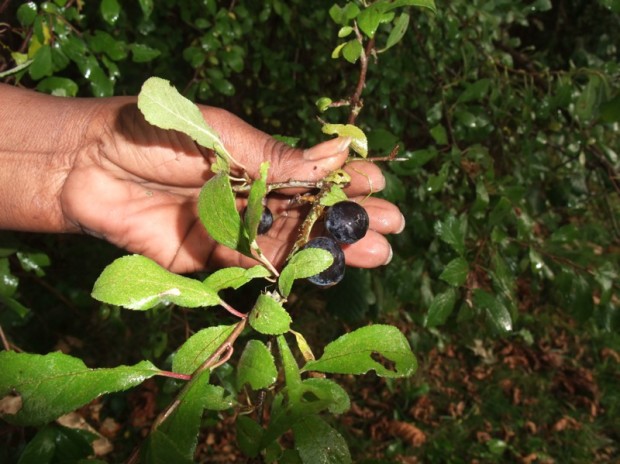You have no items in your cart. Want to get some nice things?
Go shopping
No, I should love the city less
Even than this, my thankless lore;
But I desire the wilderness
Or weeded landslips of the shore.
– The Alchemist in the City, Gerard Manley Hopkins [1]
It is the end of May, and my kitchen is alive with bubbling decoctions of blossoms as the hawthorn starts to fade and elderflower sprays take its place. The pale blush of oak apples teases in the distance; the inedible galls a cheerful reminder of the bounty to come in the months ahead. The season of abundance is upon us, and, it seems, many kitchens across the country are keen to make the most of the nation’s newfound love for wild food.
My first forays happened in childhood, inadvertently trampling blankets of alium ursinum on walks with my aunt, and being astounded by the pungent smell of garlic that rose up from the woodland floor. I felt as though I had discovered a great secret, and wanted to learn how I might cultivate it for myself. Then I started to learn about the habits of plants, their seasons, their stories, and how to read the land – town or country – by the types of plants that choose to grow there. The outdoors became a movable feast in the truest sense; a series of little treasures to be enjoyed within reach of whence they sprang, or stowed with squirrel-like jealousy – dried or in jars – for the months ahead.
Never could I have imagined then that these gustatory ephemera would one day be touted as luxury items. When in season, wild garlic can reach more than £30/kg, and its addition to recipes seems to have become a convenient way for restaurants to notch up the price of otherwise unimaginative dishes. Sad bunches of the stuff, ravaged from ancient riverbanks, are sold for high prices at London’s well-to-do farmers’ markets, and bought well past their peak by the curious and unsuspecting.
Worse still is how ground elder – a delicious plant first introduced by the Romans, now commonly targeted as an invasive garden weed – becomes a means to inflate the price of the humble grilled pork chop to levels better associated with truffles or game. It seems, that through some clever trick of marketing, we have managed to miss the point of foraged food entirely; namely, as Thoreau put it, that “the value of these wild fruits is not in the mere possession or eating of them, but in the sight and enjoyment of them”[2]. It is in the very essence of what Richard Mabey first celebrated as “Food for Free” over forty years ago.
***
“What are all the oranges imported into England to the hips and haws in her hedges?”
– Wild Fruits, Henry David Thoreau [3]
We may not need foraging for sustenance, but there is a vital need for it in terms of regaining a knowledge of, and intimacy with, what is wild and freely available in our towns and countryside, to reach at what Roger Deakin once called “the pleasure, all too rare now in England, of eating food in its natural place” [4]. It is not that the opportunity to do so doesn’t exist, nor that it requires particularly specialist knowledge in most cases. The number of times I have watched people walk past public trees laden with common, delicious fruit – from rosy red apples, to succulent pears and honey dew plums – only to seek out what is expensive, uniform and out of season, are, unfortunately, innumerable. Iain Sinclair articulated the effects of this divorce from nature well in his description of the life of the poet John Clare:
“Suddenly this village, all the common ground, is divided up into an eccentric jigsaw of little parcels. He can no longer walk, he fears to walk in the fields for the farmers turning him off… Suddenly he doesn’t understand his own landscape, which is also his language.”
[5]
We too have become like Clare: fearful of the ramifications of straying beyond the barriers of what has been set out to us, and robbed of our common ground. But there is hope: across the country there are groups of volunteers working tirelessly at preserving Britain’s forgotten orchards in both the city and the countryside. There are councils with gardeners who invest time and thought in municipal plantings, and others whose neglect has allowed nature to flourish in the corners where they have turned a blind eye. In London, there are countless community gardens and voluntary groups turning wasteland into ambulatory cornucopias for the benefit of all. From Butterfield Green Community Orchard in Hackney, to Glengall Wharf Garden in Peckham, there are people working tirelessly to ensure that we might taste “the pleasure which it yields to him who truly plucks it”[6], but it requires us first to be curious, and second to be brave, to truly reap the benefits of that firstnamed fruit.
[1] Manley Hopkins, Gerard, Poems and Prose of Gerard Manley Hopkins, ed. W.H. Gardner, London, Penguin Books, 1953.
[2] Thoreau, Henry David, and Bradley P Dean. Wild Fruits. New York: W.W. Norton, 2000, p.4.
[3] Ibid.
[4] Deakin, Roger, Wildwood : A Journey Through Trees, London: Hamish Hamilton, 2007, p.134.
[5] Sinclair, Iain. Blake’s London. London: Swedenborg Society, 2011, pp..25-26.
[6] Thoreau, Henry David, and Bradley P Dean. Wild Fruits. New York: W.W. Norton, 2000, p.5.

About Concepta Cassar
Concepta is a journalist, forager and food writer, with a particular interest in food anthropology, sustainability, and agricultural affairs. Her recipes have been featured in the Guardian, and she writes for a number of organisations, including BuzzFeed, Aftertastes, and the Soil Association. Her other great loves are literature and modern languages. Concepta speaks French and Italian, and has a working knowledge of Spanish and Russian.




